Introduction
In the dynamic landscape of franchise ownership, securing the right financing can be a pivotal factor in determining success. With nearly 3,000 franchise companies operating across the United States, aspiring franchisees must navigate a myriad of funding options to establish and grow their businesses.
From traditional bank loans and Small Business Administration (SBA) loans to personal savings and alternative lending sources, each financing avenue presents unique advantages and challenges. Understanding these options, along with the criteria that lenders evaluate, is essential for crafting a solid financial strategy that aligns with long-term goals.
As the journey unfolds, the insights from successful entrepreneurs and franchisors can serve as invaluable guides, illuminating the path toward effective franchise financing and sustainable growth.
Understanding Franchise Financing: An Overview
Franchise funding includes a range of financial methods that aspiring franchisees can utilize to learn how to get money to open a franchise and operate their business. With nearly 3,000 business entities operating in the United States today, understanding these financing options is crucial. Common sources for how to get money to open a franchise include:
- Traditional bank loans
- Small Business Administration (SBA) loans
- Grants
- Personal savings
- Investments from family or friends
Each option has its own requirements, interest rates, and repayment terms, which are crucial in shaping your economic strategy for franchise ownership. It is essential to craft a comprehensive budget that balances both fixed and variable costs while optimizing essential and discretionary expenses. By distinguishing between these cost types, you can make informed monetary decisions that support your venture’s health.
For instance, SBA financing options have evolved significantly, with updated terms becoming more favorable for franchisees in 2024. Average interest rates for business loans this year are expected to remain near 7%, making it crucial to evaluate the economic landscape closely. Adjusting your expectations regarding personal compensation is also crucial; as a new entrepreneur, your initial paycheck may be modest.
However, with patience and wise budgeting, improved business performance can result in a corresponding rise in personal earnings over time. It is important to find a balance in your budget that allows you to streamline expenses without sacrificing your quality of life. The Property Brothers, Drew and Jonathan Scott, have shared their entrepreneurial insights, emphasizing the significance of understanding monetary options and the risks associated with business ownership.
Jay Z encapsulated the entrepreneurial spirit by stating, ‘I’m not afraid of dying, I’m afraid of not trying,’ reminding us that taking calculated risks can lead to rewarding opportunities. Moreover, teachings from famous franchisors such as Ray Kroc and Steve Jobs demonstrate how their financial tactics and determination were essential in transforming their business concepts into thriving enterprises. By becoming acquainted with the different funding options and the experiences of these accomplished individuals, including case studies that emphasize their budgeting techniques, you’ll be better prepared to understand how to get money to open a franchise and navigate the intricacies of business funding for your success.
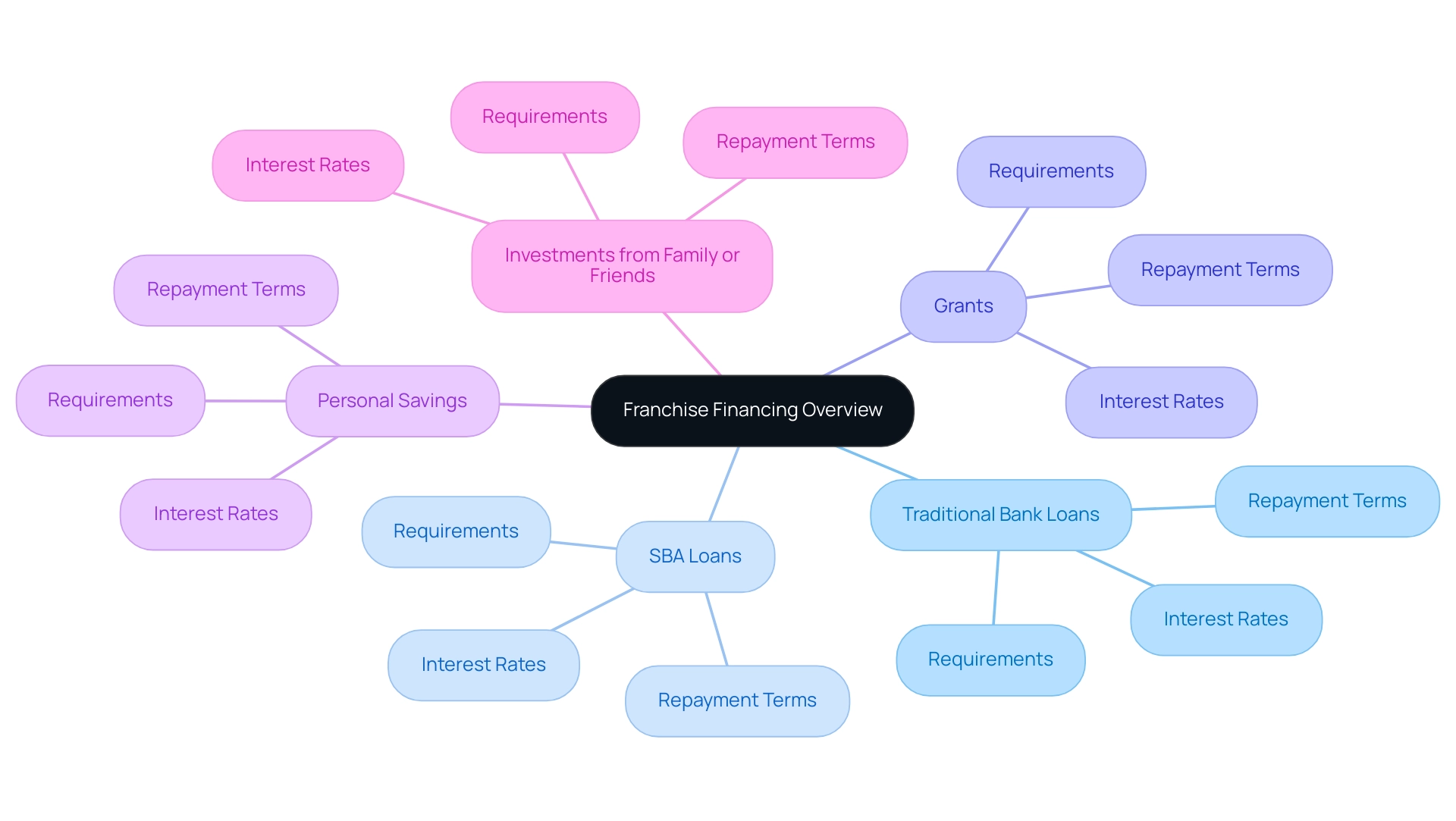
Exploring Your Funding Options for Franchise Acquisition
When considering funding options for business acquisition, a variety of pathways are available, each with its unique requirements and benefits:
- Traditional Bank Financing: Securing these funds can be quite competitive, often necessitating a strong credit history and collateral. While they may provide lower interest rates, approval rates for business funding are typically around 30%, making them a difficult choice for many potential business owners. Understanding the effective interest rates, including servicing fees tied to the applicant’s credit risk, is essential in assessing total costs.
- SBA Financing: The Small Business Administration offers advantageous funding alternatives specifically tailored for small enterprises, including business chains. The SBA 504 Program, for example, necessitates lower down payments and provides longer repayment terms compared to traditional financing, making it an appealing choice for franchisees. According to recent data, SBA funding approval rates for business enterprises have reached approximately 50%, indicating a favorable trend for new applicants. This program’s structure provides aspiring franchise owners with insights on how to get money to open a franchise more easily, which is crucial for their success.
- Franchisor Funding: Some franchisors assist in the funding process by providing direct loans to their franchisees, simplifying access to capital. This arrangement can often streamline the acquisition process, allowing you to focus on operational readiness instead of complex financing hurdles.
- Alternative Lenders: Online lenders present a quicker, albeit often more expensive, alternative. These lenders typically offer easier access to funds, which can be advantageous for those needing immediate capital, but it’s essential to consider the higher interest rates against your budget.
- Personal Savings or Investments: Tapping into personal savings or seeking investments from family and friends can provide a solid funding base. However, this method involves personal risk and should be handled with careful consideration of the potential impacts on relationships and economic stability. As you evaluate these options, carefully consider how to get money to open a franchise along with your financial situation and business plan. Each funding method comes with its own set of requirements and implications, making it essential to align your choice with your long-term business goals. Furthermore, as Christopher Kolb, Assistive Technology and Gaming Manager at Abilities In Motion, observes, ‘Comprehending the funding landscape is essential for any entrepreneur aiming to thrive in their venture.’ Additionally, the collaboration between DeSales and LCCC, which seeks to help students achieve their bachelor’s degrees, demonstrates the significance of educational support in managing the intricacies of acquisition and ownership.
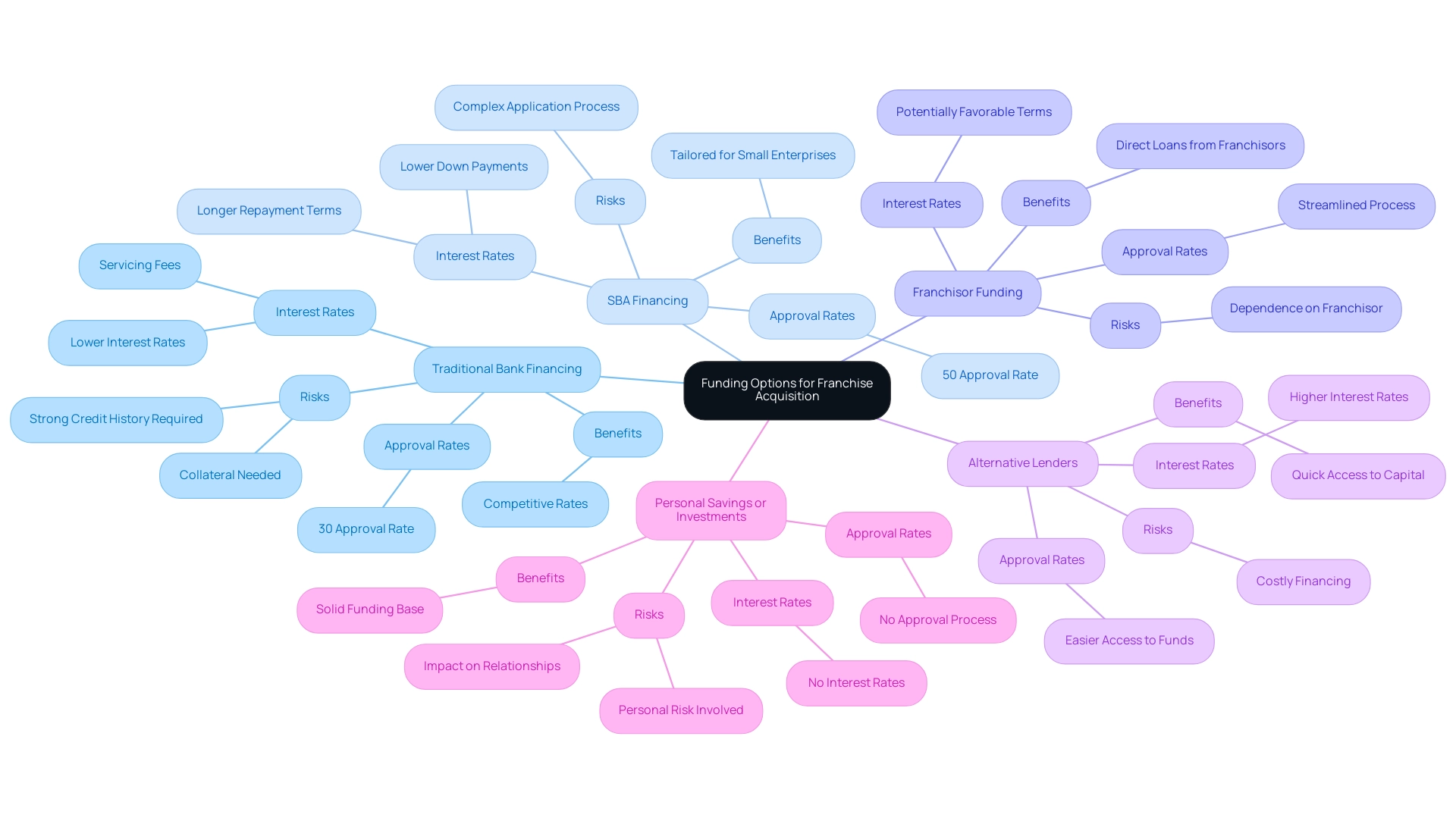
Who Qualifies for Franchise Financing? Key Criteria to Consider
To effectively traverse the realm of business funding, it’s crucial to understand how to get money to open a franchise and the standards that lenders assess. Here are several key factors that can influence your chances of securing the necessary funds:
-
Credit Score: A robust credit score, typically above 680, is crucial as it serves as an indicator of your creditworthiness.
Lenders are often more inclined to offer funding to individuals who show a strong monetary history.
-
Business Plan: A comprehensive and realistic business plan is vital.
This document should clearly outline your business model, conduct a thorough market analysis, and include well-researched financial projections. A solid business plan significantly enhances your credibility in the eyes of lenders.
-
Experience: Many lenders favor applicants with prior business or franchise experience, as this demonstrates a solid grasp of operational challenges and industry nuances.
-
Down Payment: Most funding options will require a down payment, generally ranging from 10% to 30% of the total investment.
Preparing for this upfront cost is crucial.
-
Debt-to-Income Ratio: Lenders will closely examine your existing debts against your income to ensure you have the capacity to manage additional financial commitments.
Grant, a Fibrenew franchisee, shares his experience:
At 22 years old, I was looking for a business I could call my own, where I could master a skilled trade.
Additionally, understanding how to get money to open a franchise is essential. Options include traditional bank financing, government-backed schemes, and private equity.
Microfinance institutions also provide small credit options with more flexible terms and lower collateral requirements, making them a viable choice for many aspiring franchisees.
Preparing to meet these criteria not only enhances your chances of obtaining funding but also establishes a solid groundwork for your future endeavor. Furthermore, business development banks play an essential role in this process, offering various funding products aimed at assisting franchisees through credit and equity investments, thus promoting substantial growth for small and medium enterprises.
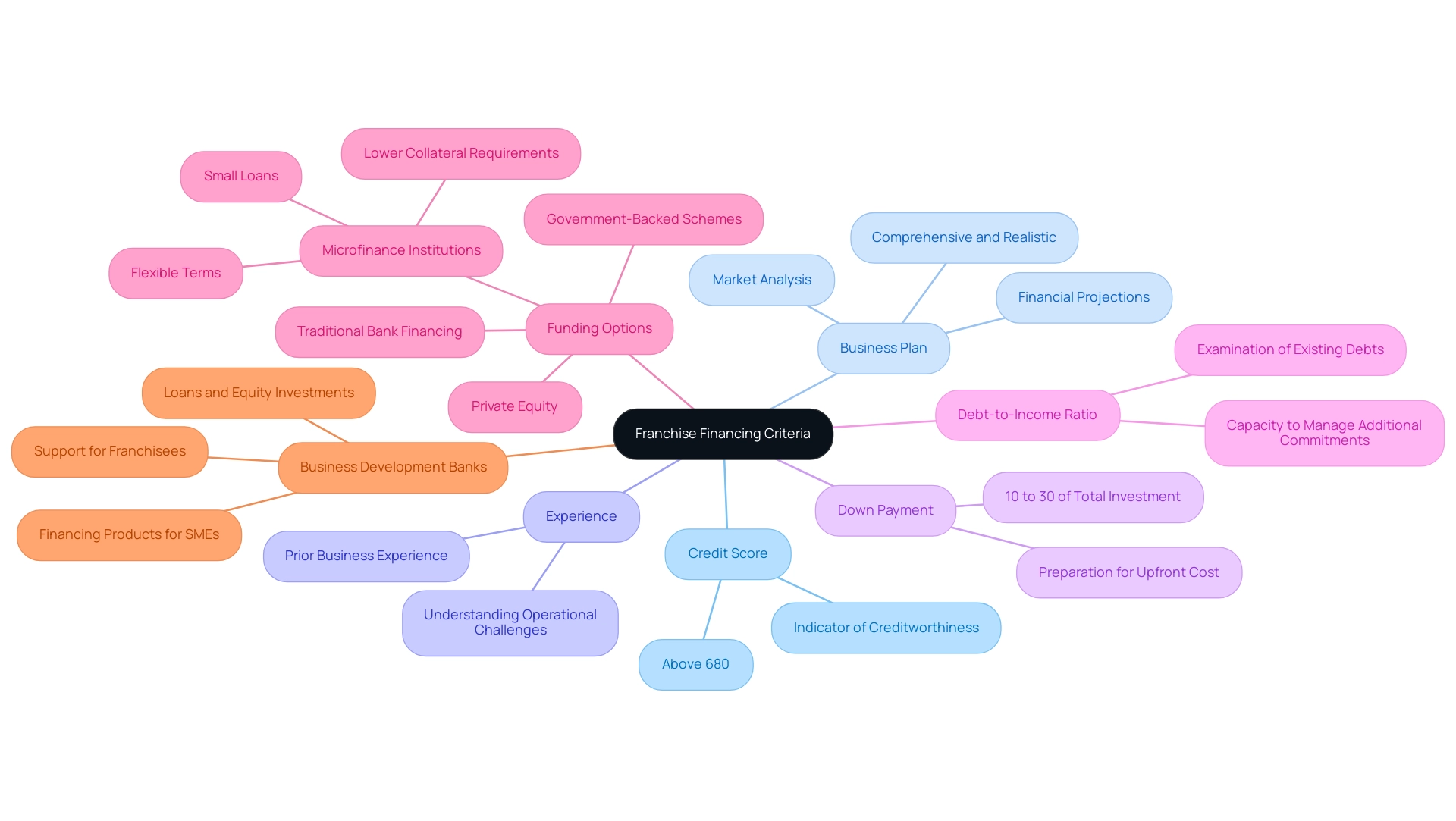
Step-by-Step Guide to Securing a Franchise Loan
To understand how to get money to open a franchise, obtaining business funding requires a systematic strategy to enhance your likelihood of success. Here’s a step-by-step guide tailored for 2024:
-
Research Lenders: Start by recognizing lenders who focus on business funding.
Focus on comparing their terms, interest rates, and the intricacies of their application processes, as these factors can significantly impact your overall costs. Recent statistics indicate that success rates for business loan applications are increasing, making this an opportune time to seek financing. -
Prepare Your Documentation: Assemble all necessary documents, including a detailed business plan, fiscal statements, tax returns, and personal financial information.
This thorough preparation can streamline the application process and present you as a serious candidate. -
Create a Strong Business Plan: Your business plan should clearly articulate your franchise concept, define your target market, analyze competitors, and outline financial projections.
A well-structured plan not only demonstrates your commitment but also instills confidence in potential lenders. -
Safeguard Your Information: As you navigate the application process, it’s crucial to protect your personal information.
The Federal Trade Commission (FTC) states, “We have attached information from the FTC’s website, IdentityTheft.gov/data breach, about steps you can take to help protect yourself from identity theft.”
Make sure to stay informed about how future communications will be handled to avoid phishing scams. -
Submit Your Application: Complete your application meticulously and submit it along with your documentation to the chosen lender.
Ensure that all information is accurate to avoid any delays. -
Follow Up: After submission, proactively follow up with your lender to inquire about the status of your application.
This step is crucial as it allows you to address any additional requests for information promptly. -
Negotiate Terms: If your loan is approved, take the time to review the terms carefully.
Don’t hesitate to negotiate terms that work better for your financial situation before signing the agreement.
Additionally, be aware of your legal responsibilities; for instance, if a data breach occurs, legal requirements dictate that businesses must notify law enforcement, affected individuals, and other businesses about the incident, as highlighted in the case study on notifying appropriate parties.
By diligently following these steps, you’re not only preparing yourself for success but also ensuring that you understand how to get money to open a franchise effectively.
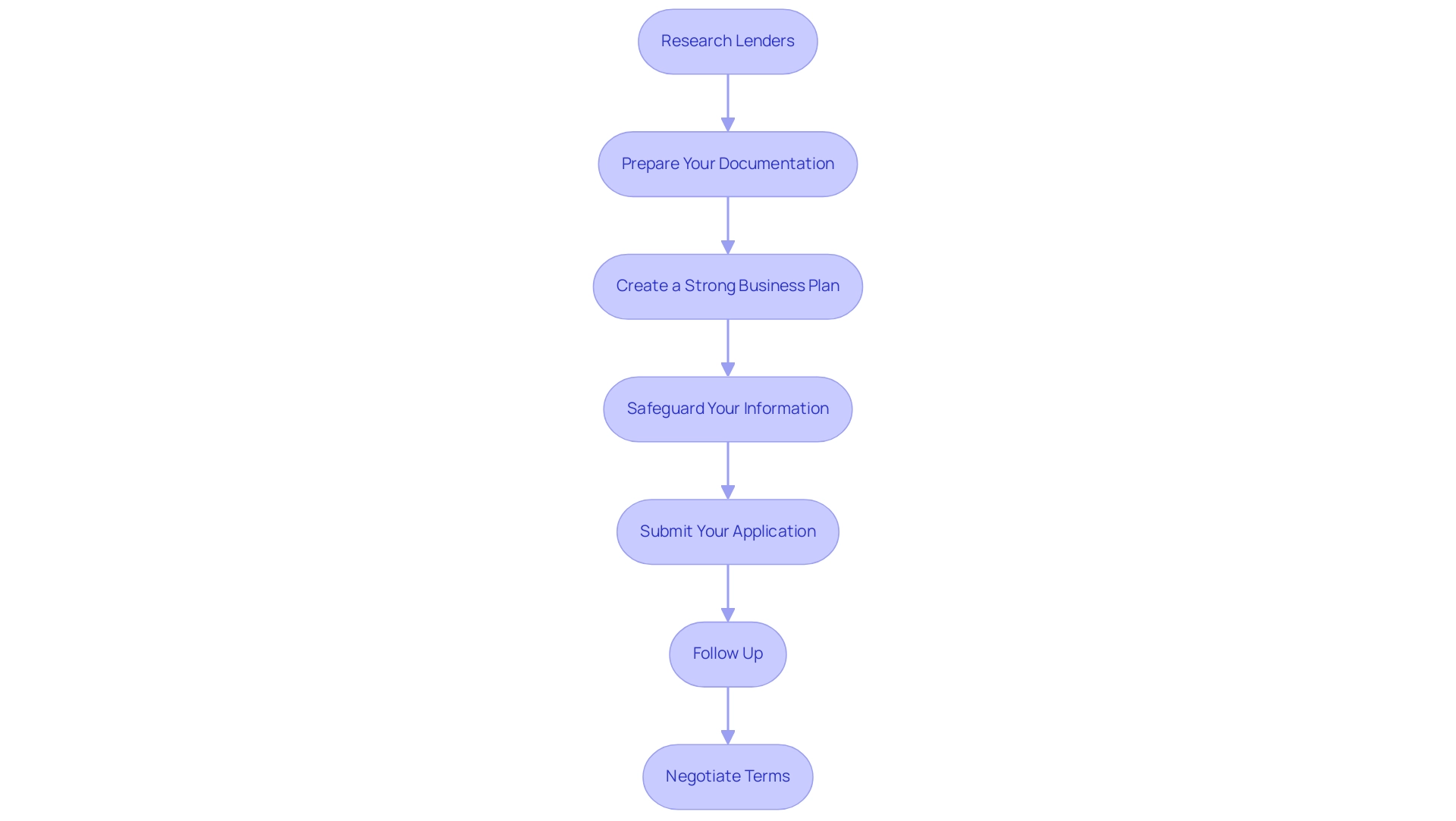
Starting a Franchise with Limited Funds: Alternative Financing Strategies
Starting the journey of business ownership with limited funds is not just a dream; it’s an attainable goal by understanding how to get money to open a franchise through several innovative financing strategies. Here are some avenues to explore:
-
Home Equity Financing and HELOCs: If you’re a homeowner, accessing a Home Equity Line of Credit (HELOC) or home equity financing can provide you with the necessary capital for your franchise.
This option often comes with lower interest rates compared to conventional financing, making it a financially wise choice. To access these services, you typically need to apply through a lender, providing necessary documentation such as income verification and property appraisal. By utilizing your home equity for a business funding down payment, you can explore how to get money to open a franchise while preserving greater personal equity and reducing your economic risk.
-
Angel Investors and Personal Networks: Seek support from angel investors who may provide funding in exchange for equity in your business. Additionally, leverage your personal networks, including friends and family, to explore potential funding opportunities and gather resources that can help kickstart your franchising journey.
-
Funding from the SBA: The U.S. Small Business Administration offers various funding options tailored for small businesses, including loans that specifically cater to franchise acquisition.
It’s worth exploring these options as they can provide essential monetary assistance, which is crucial for understanding how to get money to open a franchise. The application procedure generally includes submitting a business plan and economic projections.
-
Self-Funding Mechanisms: Consider utilizing your checking and savings accounts or cash equivalents for initial investments.
This self-funding method can reduce dependence on outside funding and teach you how to get money to open a franchise while maintaining control of your obligations. However, it’s important to weigh the potential risks of depleting personal savings against the benefits of maintaining financial independence when exploring how to get money to open a franchise.
-
Unsecured Financing: If you’re seeking flexibility, unsecured financing can be a possibility.
These loans don’t require collateral, making them a viable choice for those who may not have significant assets to leverage.
-
Crowdfunding: Utilize platforms like Kickstarter or GoFundMe to garner support from friends, family, and the broader public.
Craft a compelling narrative around your franchise vision to engage potential backers and communicate the value of your venture.
-
Partnerships: Collaborating with a person who has the necessary resources can significantly alleviate the burden of initial investment.
This partnership not only shares the costs but also combines expertise and responsibilities, enhancing the likelihood of success.
-
Grants and Competitions: Investigate small business grants or entrepreneurial competitions that can offer funding to new franchisees.
These opportunities can provide crucial monetary support for those seeking how to get money to open a franchise without the obligation of repayment.
-
Franchisor Support: Many franchisors recognize the challenges faced by new franchisees and offer various forms of financial assistance or reduced fees.
It’s essential to thoroughly investigate how to get money to open a franchise, as the support your selected business opportunity provides can make a significant difference in your initial investment.
-
Business Funding: It’s essential to recognize that business funding can frequently cover up to 80% of the overall project expenses, rendering them a feasible choice for enterprise support.
However, be aware that banks may not always specialize in franchise loans. Consulting with dedicated funding partners, such as Apple Pie Capital, can provide tailored solutions that meet your specific needs.
-
Convertible Debt Funding: This alternative funding strategy allows lenders to convert their debt into equity in the company, providing potential upside in successful exits.
This choice can be advantageous for both lenders and business owners, aligning interests in the event of a successful transaction.
By exploring these alternative financing strategies, you can discover creative and effective ways for how to get money to open a franchise, even when faced with financial constraints. As Ryan Romanoff insightfully points out, it’s like using your retirement money to start a business. You could do it, but there’s a better way to get debt that’s designed for business use, and that is a business loan.
Embracing these options will empower you to take the next steps toward successful franchise ownership.
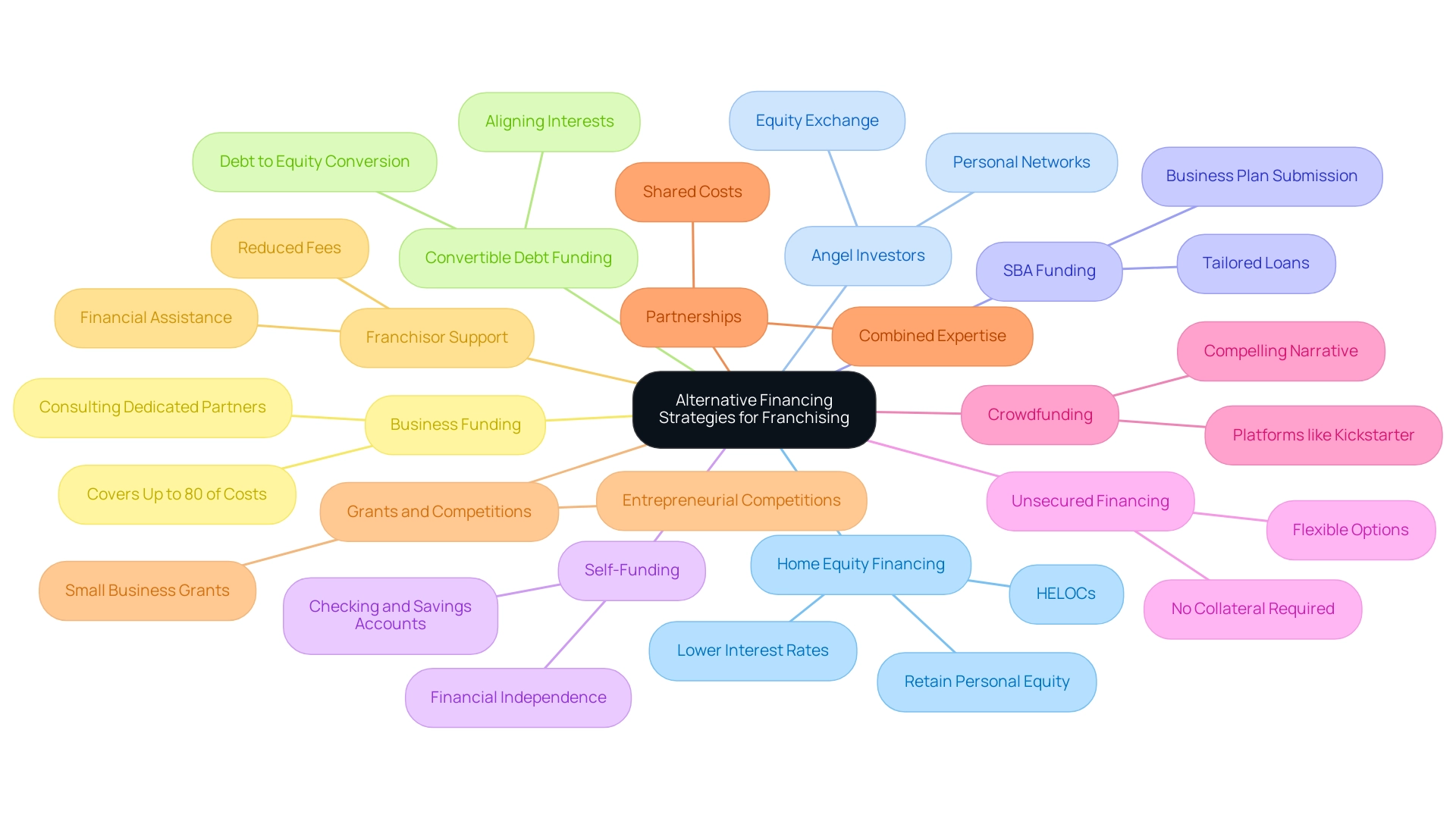
Conclusion
Navigating the world of franchise financing is a crucial step for aspiring franchisees aiming to turn their business dreams into reality. The various funding options available—from traditional bank loans and SBA loans to alternative lending sources and personal savings—each offer distinct advantages and challenges that must be carefully weighed. Understanding these avenues, alongside the criteria that lenders evaluate, can significantly enhance the chances of securing the necessary capital to launch a franchise.
Moreover, the journey toward successful franchise ownership involves more than just access to funds. It requires a well-thought-out financial strategy, informed decision-making, and the ability to adapt to changing economic conditions. Insights from industry leaders and successful entrepreneurs highlight the importance of perseverance and calculated risk-taking, reminding franchisees that while the path may be fraught with challenges, the potential rewards are substantial.
Ultimately, the key to thriving in the competitive franchise landscape lies in thorough preparation and a proactive approach to financing. By leveraging the lessons learned from experienced franchisors and understanding the intricacies of various funding options, aspiring franchisees can position themselves for success. With the right financial strategy in place, the journey toward franchise ownership can transition from a dream into a lucrative reality, paving the way for sustainable growth and long-term achievement.


